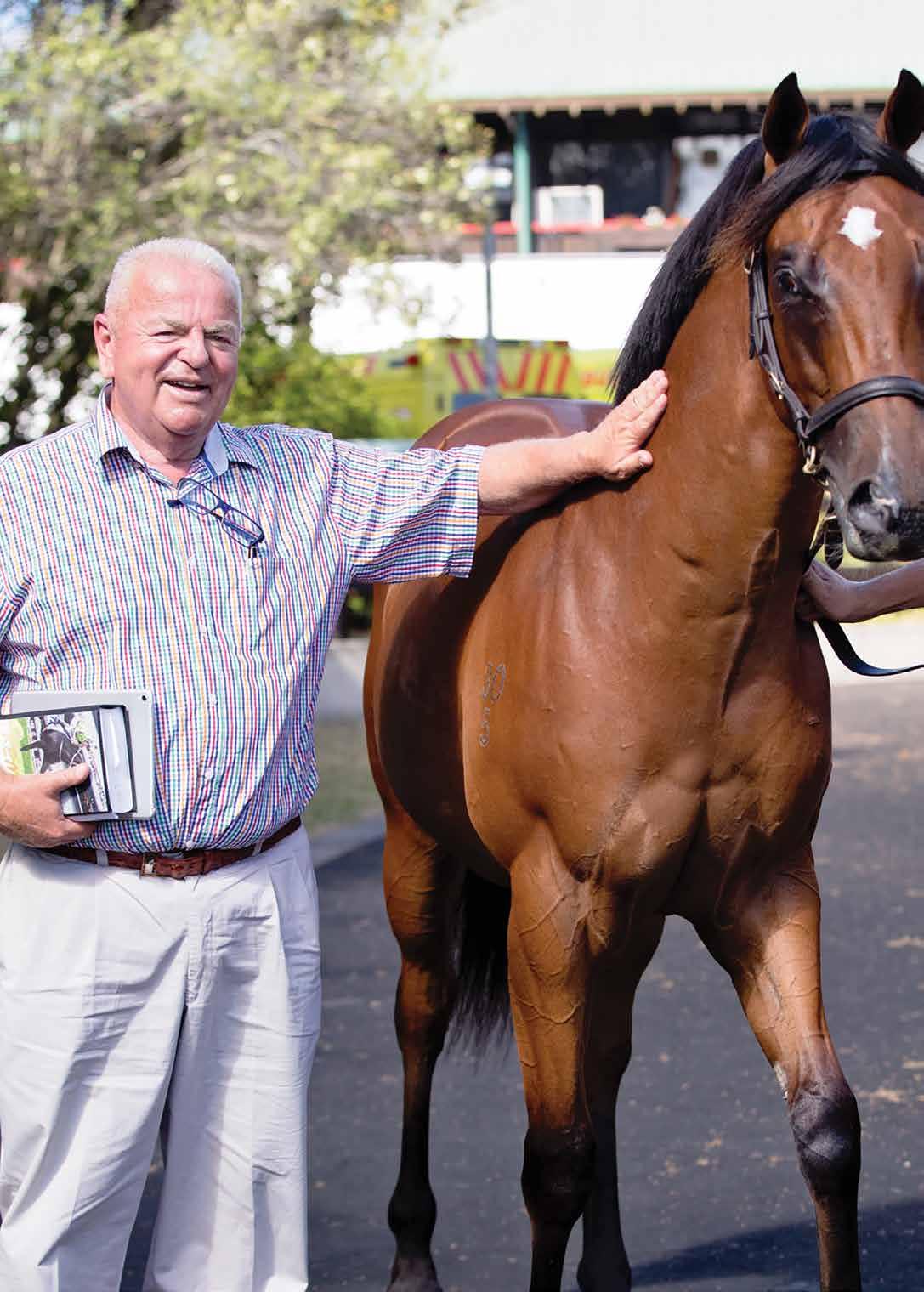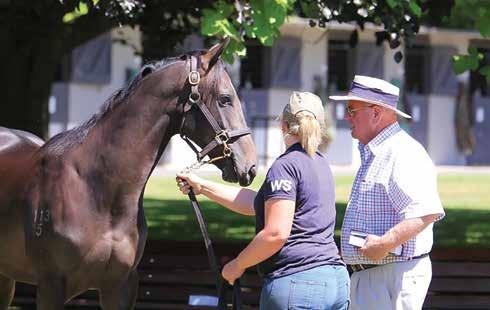
9 minute read
OF FARM
AND FORTUNE
By Lydia Truesdale
In 1979, 25-year-old David Ellis took out his first rural bank loan. The self-made multi-millionaire and race horse breeder, buyer, owner and bloodstock consultant has since created the greatest privately-owned empire the New Zealand Thoroughbred racing industry has ever seen in Te Akau Racing; and many New Zealanders benefit from its success without ever knowing it.
Given all he’s achieved, David’s approach to life is surprisingly simple…
When David Ellis established his own 20-strong Thoroughbred horse training stables in Matamata in 1985, he wouldn’t have believed you had predicted the legacy it would become today. Te Akau Racing employs 50 people full-time in New Zealand and many part-time but its reach filters further through New Zealand’s community than that – to the farmers, health professionals, breeders, owners, syndicators, bookies, punters, strappers, jockeys, announcers, track riders, track staff, hospitality vendors, retailers and more. It has injected more than $80 million into New Zealander’s pockets through the annual Karaka yearling sales alone – and an immeasurable amount more through race day winnings, employment opportunities and other revenue. It has facilitated more than 1,000 racehorse owners over its time and bought and trained well over 1,100 racehorses – at least 160 of them stakes’ winners. What good business looks like, to David, is happy horses, happy owners and happy staff; the trio of “true heroes” of the racing industry without whom David knows he wouldn’t have a business. “We spend a lot of time communicating with them and we enjoy doing that,” David says. “We enjoy going to the races and seeing the thrill owners get from winning, and we love seeing our young staff develop their careers and lives.” Things could have been very different for David and Te Akau – David recalls a time in the late 1980s when he went from paying nine percent interest to 22 percent interest within 18 months – but his determination is unyielding. “I learned that business is hard work, it’s risky, but it taught me to be conservative and pay as much debt as I could,” he says. “We’ve had a lot of very good years since then.” The starting gates Born in Auckland in 1953, David attended Kings’ College, where he excelled representing the school at rowing, cricket, swimming, athletics and rugby. His final year of secondary study was spent at Flock House agricultural college in Bulls, studying various agrarian topics. However it was a serendipitous foray – at a girlfriend’s suggestion – to the 1971 Ellerslie races’ Easter meeting that initiated David’s fascination with the spectacle that is racing. “I went with $12 in my pocket, I had $2 eachway on a horse that won and paid $30, I finished up going home with $85, and I thought, ‘This has got to be the easiest way to make money of all time’,” David recalls. “From that day on, I’ve been completely hooked on racing.” David furthered his agricultural depth through Massey University before entering the workforce – and no one can accuse him of not having laboured for all the spoils he’s enjoyed. His first full-time job was on a station in the Waikato for $35 gross per week. Then, for three years, he worked three jobs from Monday through Saturday, from 4:30am until 8:30pm, six days every week, as well as pouring gas at the service station on Sundays. His spare time was spent reading Best Bits publication and familiarising himself with the form of basically every horse in New Zealand. Having saved $40,000 at that time was not only testament to David’s drive and work ethic but also security enough get a rural bank loan. He bought his first farm in 1979 – 550 acres in the Waimau Valley for $215,000 – and he’s been farming his way to fortune ever since. David developed the run-down Waimau Valley sheep and cattle farm for sale and with the proceeds purchased the farm he still lives on today. Over the next 40 years, he bought out seven neighbours to accumulate a total 4,000 acres. That land is the home and heart of the prestigious Te Akau Stud and Te Akau Racing. Te Akau (‘The Right’) Te Akau principal David Ellis is proof that background needn’t determine success. For someone who doesn’t hail from a farming family, he has created one of New Zealand’s most profitable and respected farming brands on the slipstream of hard work, great people, and a little good luck. Te Akau stud ‘winters’ 2,200 cattle, 3,000 breeding ewes, 700 ewe hoggets, and about 150 horses. Of Te Akau’s 4,000 acres, 1,000 is specifically fenced for horses. David owned his first race winner in 1978: a mare on lease, called Magnum, who thrillingly won again the following year at Ellerslie. He recalls his father’s initial distain that he was pursuing a career in horse racing. Subsequently, he became among David’s biggest and earliest supporters and together they co-trained their first Group One (G1) winner in 1986 in Cosmetique. David’s first G1 win on Australian soil came in 1992 and he has since been involved with at least 50 G1 winners. Since meeting his second wife, Karyn FentonEllis, 16 years ago – who, at the time, was already a leading lady of the racing industry and a familiar face through her role as one of two inaugural TAB Trackside Television presenters – David says Te Akau has grown considerably in stature. “Karyn is an enormously important part of the business,” he gushes. “She is a huge help in selling the horses we buy – in the last calendar year, we bought 70 horses and syndicated them all.” One would be challenged to find anybody else in the world doing that. Te Akau lends itself to a company culture that is led from the top down and it’s true that good business attracts good people. Mark Walker strolled up Te Akau’s drive, resume in hand, as a teenage lad when Te Akau had no vacant positions. He was hired on the spot and has remained with Te Akau for the 30+ years since, going on to become one of New Zealand’s most prominent horse trainers as well as David’s friend and business partner. While Mark handles Te Akau’s international operations from Singapore, its next generation of superstars is emerging on home soil with Jamie Richards leading the charge. Since joining Te Akau Racing as racing manager in 2014, 30-year-old Jamie has become the sole trainer for Te Akau Racing in New Zealand, has trained more than 440 winners including 26 at the elite G1 level, and he currently leads the 2020 Trainer Premierships. David speaks highly of Jamie as being “extremely dedicated, extremely focused and extremely capable”, and places great emphasis on the enjoyment he gets from working with Jamie and his family – who are also employed by Te Akau through their various key roles. Buy, sell, race The first and foremost step in training a winner is having a good horse; and David is modest about his eye for a good buy. There are traditional conformational traits that many a good horseperson looks to as determiners of an equine’s potential. David, on the other hand, has no set criteria and rather visualises how each horse will grow and develop. “When you buy these horses when they are one year old, it’s quite irrelevant what they look like,” he says. “What is very relevant is what they will look like 12 or 24 months later when you leg the jockey on for the first time. “A lot of these horses develop significantly between one, two and three years of age and I’ve been incredibly lucky to build up a clientele of people that have backed me and that believe in Te Akau Racing.” David goes to the sales with the plan to buy a mixture of horses. This hedging of bets creates a pool of horses that are physically and then suitably prepared to fill out local and international racing calendars and appeal to the full spectrum of existing and new owners. Te Akau has made history on several occasions throughout New Zealand as well as internationally, and each accoldade enjoys its own merriments. Just recently, in 2019, with Horse of the Year Melody Belle, Te Akau was the first-ever to train a horse to win the Hawkes Bay Triple Crown. Melody Belle is now the claimant of more G1 wins than any other horse in the world last calendar year. Te Akau has won the Karaka Million 2YO and 3YO Classic races the last four years in a row. This year, with Probabeel, Te Akau was the firstever to have won the Karaka Million 2YO and returned with the same horse to win the Karaka Million 3YO Classic the following year. With stables in both Matamata and Singapore, as well as in Christchurch each spring, Te Akau’s positive influence is synonymous with its substantial growth. Under David’s leadership, Te Akau was named Gallagher Agriculture and Primary Production award winner at the 2009/10 Waikato Business Excellence Awards as well as a finalist in the Excellence in Service Award and Employer of the Year Award. David himself was a finalist in the Waikato Management School Leader of the Year award. David’s voluntary contribution to the industry has been significant and ongoing. He has been a race day steward, is a life member and former chairman of the Waikato Racing Club, sat on the NZTR Board for seven years and served as Northern Director, and represented NZTR on the New Zealand Thoroughbred Marketing Board, and is a lifetime sponsor of the David and Karyn

Ellis Fillies’ Classic (formerly the Group 2 Sir Tristram Fillies’ Classic).
A billion-dollar industry If Te Akau were strictly farmers as opposed to horse trainers, David estimates they would employ probably just three people as compared to the 70+ people currently on their payroll.
“We are significant employers of mainly young people, we’re a big export industry, and we put on a great show for the race meetings,” David says of the racing industry’s contribution to the New Zealand economy.
Few are more conscious of that than Deputy Prime Minister and Minister of Racing, Winston Peters.
“The NZ racing industry is fortunate that Winston Peters is the Minister of Racing,” David says. “He actually understands the contribution racing makes to the NZ economy.
“He’s been very supportive, putting important and much needed legislation forward that will meaningfully improve and help racing in New Zealand and its beneficiaries.” One of the things the industry is lacking is money at every level. David is outspoken when it comes to the amount the industry has been over-taxed by numerous previous governments; but he is also grateful for the resolution proposed through the introduction of a ‘product fee’.
This will mean that if you’re offshore and you wish to bet on New Zealand racing, you will have to pay a small percentage – a product fee – to the NZ TAB. This will contribute an additional $25 million a year to New Zealand’s three racing codes: Harness Racing, Thoroughbred Racing and Greyhound Racing.
With this legislation being progressed and the latest crop of foals from the 2020 yearling sales, David is increasingly optimistic about the New Zealand racing industry’s future.
Te Akau purchased seven horses from this year’s Gold Coast Yearling Sale and 30 from the Karaka NZB Yearling Sale. “I would say without any doubt it’s the best crop of horses that I’ve ever bought,” David says.
“It is unbelievably exciting because in this business the trainer’s success, the stable’s success, the owner’s success, my success, it all starts at the sale ring. If you don’t buy the right horse, you’re not going to win good races going forward.
“I took Mark Walker around the farm last night and he said this is the best lot of horses you’ve ever bought.”

